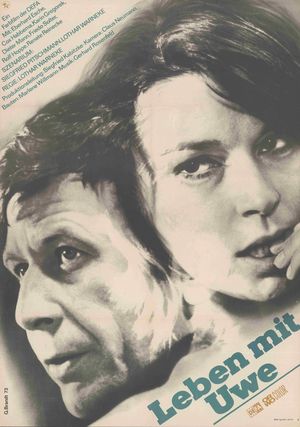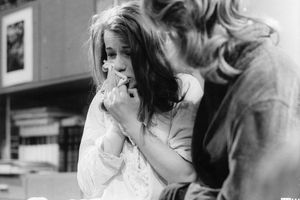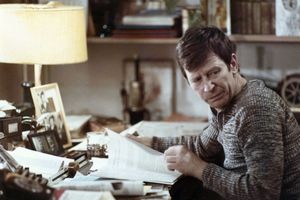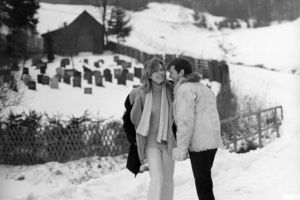Leben mit Uwe
Director: Lothar Warneke, 102 Min., Color, Feature Film
Deutsche Demokratische Republik (DDR)
DEFA-Studio für Spielfilme, 1973
- Film/Video Format
- 35 mm
- Length in m
- 2802
- Other Title
- Das Doppelhelix; Das eine und das andere
- English Title
- Living with Uwe
- Premiere Date
- Release Date (for Cinema)
- Literary Source
- Pitschmann, Siegfried: Fünf Versuche über Uwe, Erzählung

(Dir.: Lothar Warneke, 1973) Graphic Design: Gernot Brandt
Short Summary (English)
Uwe Polzin, a highly talented biologist publicly stands the defence of his doctorate and this crucial day prompts him to look back on his life so far. These reminiscences are not altogether positive and he and his family still face almost unsolvable problems. For; while Ruth, Uwe's sister, consciously goes without family life and private happiness in order to devote herself fully to her vocation as a doctor; he tries to reconcile career and family. He has found in Alla, his wife - an interpreter - not only a truly loving partner but also someone who shares his basic view of life. Still, their marriage is undergoing a crisis. Uwe's job has become so demanding that he expects her to cope with a great deal of domestic problems. Alla senses that her husband is exploiting her love towards him and that he expects her only to make sacrifices for him. This is why she is contemplating divorce. Uwe loves his wife and children very much, but today, this significant day, he realizes quite well that his research work will continue to demand his utmost efforts. There is no simple answer to this problem. Only by accepting the constantly emerging contradictions and by maintaining high claims to a high-quality life can there be a chance of staying together.
Source: Progress Film-Verleih

(Dir.: Lothar Warneke, 1973) Photography: Dieter Jaeger

(Dir.: Lothar Warneke, 1973) Photography: Dieter Jaeger
Film Crew
- Director
-
- Lothar Warneke
- Script
-
- Lothar Warneke
- Scenario
-
- Siegfried Pitschmann
- Lothar Warneke
- Camera
-
- Claus Neumann
- Film Editing
-
- Erika Lehmphul
- Cast
-
- Eberhard Esche (Uwe Polzin)
- Cox Habbema (Alla Polzin)
- Karin Gregorek (Ruth Polzin)
- Dieter Mann (Dr. Hunger)
- Friedo Solter (Prof. Holzmann)
- Carl Heinz Choynski (Jonas)
- Rolf Hoppe (Dr. Bohnsack)
- Ute Harthun (Fräulein Lederberg)
- Renate von Wangenheim (geb. Reinecke) (Fräulein Engel)
- Ruth Kommerell (Uwes Mutter)
- Micaéla Kreißler (Karin)
- Gert Gütschow (Haberland)
- Marianne Christina Schilling (Frau Haberland)
- Walter Bechstein (Schneider)
- Karl Hermann Röhricht (Uwes Vater)
- Ester Ajuluchuku (Fräulein Santiago)
- Gotthold Gloger (Dr. Gutsche)
- Jarmila Kalovská (Ruths Nachbarin)
- Charlotte Marunke (Tante Käthe)
- Michaela Gerdaur (Susanne)
- Sabine Schröder (Martina)
- Thomas Buchholz (Uwe, 6 Jahre)
- Heike Melzer (Ruth, 9 Jahre)
- Siegfried Kabitzke (Ausbilder Karl)
- Jürgen Heinrich (Student A)
- Michael Krull (Student B)
- Werner Wieland (Herr vom Nobel-Komitee)
- Ilona Brömmer (auch: Brömmer-Weiß) (Vollbusige Dame)
- Siegfried Pitschmann (Wissenschaftler)
- Sadegh Shabaviz (Barkeeper)
- Lothar Warneke (Oberassistent)
- Tadeusz Blaziewsky (Pole)
- Marek Czosnoyc (Pole)
- Marciel Dunayski (Pole)
- Wolfgang Kiel (Mönch)
- Assistant Director
-
- Angelika Mackrodt
- Dieter Bölke
- Michael Krull
- Assistant Camera
-
- Klaus Zähler
- Production Design
-
- Marlene Willmann
- Script Editing
-
- Christel Gräf
- Christa Müller
- Music
-
- Gerhard Rosenfeld
- Sound
-
- Werner Schulze
- Günter Witt
- Gerhard Ribbeck
- Costume Design
-
- Dorit Gründel
- Make-Up
-
- Bernhard Kalisch
- Inge Roloff
- Production Management
-
- Siegfried Kabitzke
- Unit Production Management
-
- Günter Berger
- Ralf-Detlef Biok
- Peter Gärtner
- Consulting
-
- Erhard Geißler
- DEFA Photography
-
- Dieter Jaeger
Awards
- Kunstpreis der DDR (1974): Kunstpreis der DDR - Lothar Warneke
Short Summary (German)
Der Biologe Uwe Polzin steht vor der Verteidigung seiner Dissertation. Es ist ein Tag, der ihn nachdenken lässt über sein bisheriges Leben. Seine Frau Alla trägt sich mit Scheidungsgedanken. Beide haben immer alles gewollt, Erfüllung in der Arbeit und in der Liebe. Sie waren sich einig, auch darüber, dass dies nicht einfach sein wird. Uwes wissenschaftliche Arbeit fordert den größten Teil seiner Zeit und Energie, für Alla und die beiden Kinder ist oft nicht viel geblieben. Alla, die ihre Arbeit als Dolmetscherin ebenso liebt, musste oft zurückstecken, der Familie wegen. Sie fühlt sich ausgenutzt. Uwe vergleicht sein Leben mit dem seiner Schwester Ruth, die Ärztin ist. Sie hat, um sich ihrem Beruf ganz widmen zu können, auf eine Familie verzichtet. Für Uwe scheint dies keine Alternative. Auch Alla hat an diesem Tag über vieles nachgedacht, und als Uwe zur Verteidigung seiner Dissertation im Hörsaal erscheint, sitzt Alla unter den Zuhörern.
(Quelle: Das zweite Leben der Filmstadt Babelsberg. DEFA-Spielfilme 1946-1992)
Short Summary (Other Languages)
Il giorno della discussione della sua tesi di dottorato, Uwe Polzin, un biologo, riflette sulla sua vita. Con Alla, sua moglie, che oggi pensa di lasciarlo, hanno sempre voluto realizzarsi sia professionalmente che in amore. Eppure, mentre Uwe ha dedicato gran parte del suo tempo e impegno alla ricerca scientifica, Alla, un'appassionata interprete, ha dovuto in parte rinunciare al lavoro per dedicarsi ai figli e, oggi, si sente sfruttata. Uwe raffronta la sua vita con quella di sua sorella Ruth, che per fare carriera come medico, ha completamente rinunciato alla famiglia, cosa che Uwe non sarebbe disposto a fare. Anche Alla ha riflettuto molto e quando Uwe entra nell'aula per discutere la sua tesi, lei è fra il pubblico ad ascoltarlo. (Italienisch)
Ce film nous conte l'histoire d'une famille, comme beaucoup d'autres, en RDA, celle d'Uwe et d'Alla, sa femme. Uwe est un jeune scientifique qui se trouve à un tournant de sa carrière : il doit défendre sa thèse de doctorat. Or, Alla, qui travaille elle aussi, pense un jour au divorce. Le film aborde les problèmes des rapports dans la famille, la vie du couple et la vie professionnelle et enfin ceux qui peuvent exister dans le milieu du travail. (Französisch: Archives Seine Saint Denis)



